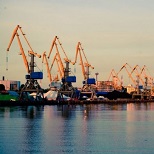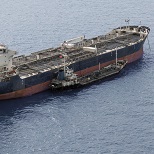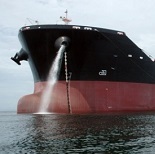Vessel arrest and detention in Georgia. Part 1
Each Black Sea country – Ukraine, Russian Federation, Georgia, Turkey, Bulgaria, Romania and Moldova, new Black Sea country – has special rules of vessel arrest. These peculiarities determine differences in vessel arrest practice in these countries. Such practice, i.e. actual attitude to vessel arrest in each Black Sea country, determines the rules themselves.
It means that attempts to unify such rules have not yet given and will unlikely give the positive result. Such situation complicates essentially the tasks regarding legal support of vessel arrest and release.
But it does not mean that attempts of maritime association to unify the abovementioned rules do not give the results at all. For example, Russia, Romania and Ukraine are members of the International Convention Relating to the Arrest of Sea-Going Ships (Brussels, 10.05.1952). Bulgaria is member of the International Convention on the Arrest of Ships (Geneva, 12.03.1999). Other states are members of neither convention on the arrest of ships.
In Ukraine, Russia, Turkey, Bulgaria and Romania vessel arrest practice is researched quite well, in Moldova it is still in the egg, while in Georgia it is too rich but not well-known enough.
The fact that for the last 8 years the cargo turnover rate increased by 60% confirms that Georgian ports perform transit function being the vital transit hub of TRASECA corridor. The reason is the increase of cargo turnover between Transcaucasia, Central Asia and Europe. The aim of our publication is to show legal practice and the corresponding law institutes in Georgia.
Some theoretical arguments
Vessel arrest and detention are important international maritime law institutes. These terms differ from each other but in practice they are often merged or substituted by each other.
It is not a surprise because the international conventions on the arrest of ships determine the term of arrest by means of the term of detention. So vessel detention is the generic term and vessel arrest may be deemed as kind of detention in the context of definitions thereof.
For example, according to Clause 2 Article 1 of the International Convention Relating to the Arrest of Sea-Going Ships, "arrest" means the detention of a ship by judicial process to secure a maritime claim, but does not include the seizure of a ship in execution or satisfaction of a judgment. But according to Clause 2 Article 1 of the International Convention on the Arrest of Ships, "arrest" means any detention or restriction on removal of a ship by order of a Court to secure a maritime claim, but does not include the seizure of a ship in execution or satisfaction of a judgment or other enforceable instrument.
In fact general discussions will hardly find such definition which could be treated both as a generic term of vessel arrest and as a specific term of vessel detention.
So we can treat both vessel detention in general as any restriction on removal of a ship and vessel detention in particular as restriction on removal of a ship performed by administrative procedure, as compared to vessel arrest performed by judicial procedure in order to secure maritime claim.
The Georgian law determines detention as restriction on removal of a ship performed by competent body/authority in order to investigate and eliminate the reasons for vessel detention. In fact such action means certainly administrative measure. There are three kinds or types of detention.
Types of vessel detention
First type means vessel detention due to violation of public maritime law regulations, rules and laws of Georgia. Such detention shall be performed by the corresponding authorities for the purpose of investigation. The Law of Georgia on Maritime Spaces (No.1756 dd. 24.12.1998) provides the causes of detention.
According to Article 65 of the present Law, detention and hot pursuit of vessels under the foreign flag shall be performed in case when the vessel:
a) violated the law of Georgia in the internal waters or territorial sea thereof;
b) intends to violate customs, emigration, fiscal or sanitary law of Georgia in the contiguous zone thereof;
c) violated sovereign rights and jurisdiction of Georgia regarding the exclusive economic zone and continental shelf thereof.
The Law of Georgia on State Border (No.1569 dd. 17.09.1998) expands the grounds for vessel detention. According to Article 36 of the present Law, the authorized body of the Ministry of Internal Affairs of Georgia shall detain the Georgian or foreign civil vessel in the territorial sea and internal waters and shall convoy it to the nearest port or other corresponding point if:
a) the vessel is in the maritime exclusion area, heads for the maritime exclusion area or fails to comply with the set rules of sailing along navigation routes and following the recommended courses;
b) embarkation/disembarkation, loading/unloading is performed in areas not provided by the State Border Regime and Security Rules;
c) the vessel performs illegal fishery, scientific and hydrographical research, emission or disposal of hazardous substances and living marine resources, or pollution of marine resources;
d) aircraft lands on board (or takes off) without permission of the corresponding competent authorities;
e) vessel master fails to submit vessel, cargo, passenger and other required documents;
f) vessel fails to comply with orders and instructions of the competent bodies of the Ministry of Internal Affairs and other bodies stated in the State Border Regime and Security Rules;
g) vessel violates rules and international law standards stipulated by the present Law, other acts of legislation of Georgia, international treaties and agreements.
In respect of the detention procedure itself, the Law on State Border stipulates that vessel detention shall be executed by the corresponding protocol made up and signed by representatives of the authorized bodies of the Ministry of Internal Affairs of Georgia. Master of the detained vessel is also recommended to sign the protocol. After vessel detention, vessel/cargo documents kept at master’s are subject to confiscation. Vessel master has a right to appeal against actions of the authorized bodies which performed the detention procedure, or against the protocol content, or to make remarks in any language it deems fit – both in the protocol itself and in any document attached thereto. If master denies its signing authority the authorized representatives shall make a corresponding remark in the protocol and the documents shall be deemed as handed in to vessel master.
Vessel detention for the reason of environment pollution shall be performed under the result of waste water analysis (upon vessel or samples taken around the anchored vessel) performed by the Conventional Inspection on Black Sea Protection. Meantime, the administrative proceeding shall be initiated; the corresponding protocol shall be made up with evidence of violation and explanation of involved parties attached.
In case of failure to make voluntary payment of imposed sanctions, the detained vessel shall be subject to public sale. In case of failure to sell the vessel it shall be subject to confiscation in favour of the state.
It is noteworthy that the law of Georgia provides also guarantees for damage compensation caused by groundless vessel detention (with certain clause). In particular, Article 68 of the Law on Maritime Spaces provides that if the foreign vessel was delayed or detained groundlessly beyond the territorial sea of Georgia, the caused damage shall be compensated. I.e. burden of proof of groundless delay or detention shall be imposed on the corresponding body which performed the inspection/detention procedure and burden of proof of damage caused by such actions shall be imposed on the vessel’s authorized representatives.
Georgia sets the abovementioned legal standards in compliance with general rights of costal state provided by international standards, in particular with the Convention on the Law of the Sea dd. 10.12.1982, e.g. Articles 28, 73, 111 and 220. Georgia has been Party to this Convention since 09.09.1995
Taking into account the abovementioned legal standards and the current practice, in order to generalize the typical peculiarities of the present type of vessel detention we can make the following conclusion:
1. Vessel detention shall be performed in order to investigate, whether there was any violation of law, sovereignty, sovereign rights and jurisdiction of Georgia, orders and claims of competent bodies (representatives) as well as in order to prevent illegal activities at sea, disposal of waste/materials hazardous for human and marine resources performed within the exclusive economic zone (continental shelf) of Georgia.
2. The competent body which has a right on such detention shall be Coast Guard Department of the Border Police of the Ministry of Internal Affairs of Georgia.
3. Detention shall be applied to all vessels (national and foreign ones) in the same mode, except military vessels.
4. Detention may be performed both on the grounds of the preliminary inspection results and as pursuit.
5. The vessel may be detained for the whole investigation period: either as security in case of administrative violations or as crime instrument in case of criminal violations.
6. Taking into account nature of violations and provided sanctions, there are possible vessel release and other kinds of securities, in particular, guarantees of P&I clubs or court deposit.
7. The issue of vessel release with providing appropriate security shall be considered and settled by the authority which performed detention or by the first instance court whose competency spreads on location of the detained vessel.
8. In fact vessel detention shall be deemed as a part of administrative or criminal case proceeding and the purpose of detention shall be investigation aimed at bringing certain parties to administrative or criminal responsibility if they are found guilty.
9. In administrative case proceedings the liability (fine) shall be imposed on vessel master. In criminal case proceedings such liability shall be imposed on master or certain person (crew member) who committed illegal action determined under the results of investigation.
Despite correspondence of the abovementioned domestic standards to the international law, in most cases the problem arises in procedural implementation, investigation, assessment and vessel release till the dispute settlement in fact. Taking into account such specific features, it is reasonable to involve attorneys-at-law in case proceeding from the first hour of vessel detention and initiation of proceeding. In order to make an efficient tactics of defense, first of all it is important to find out circumstances of alleged violation and to fix the corresponding evidence. Further, taking into account the nature of violation and the corresponding procedural instruments, there is possible vessel release before completing case proceeding in fact.
Second type means vessel detention for the reason of securing navigation safety and preventing ion of the environment.
Such type of detention is deemed as part of administrative proceeding. The right to detail vessel in such cases is vested on:
- For the reason of navigation security: the corresponding Port State Control which belongs to the Maritime Transport Agency of Georgia;
- For the reason of environment pollution: jointly on the Coast Guard Department of the Border Police of the Ministry of Internal Affairs of Georgia and the Black Sea Conventional Inspection of the Ministry of Environment Protection and Natural Resources of Georgia. Georgia is the member of Regional Convention on the Protection of the Black Sea against Pollution (1992, Bucharest).
Such type of vessel detention shall be performed in inland waters of Georgia, mainly in port water areas.
In respect of navigation security, vessel detention is exhaustively governed by international maritime conventions SOLAS-74, STCW-95/2010, MARPOL etc., ratified by Georgia. In fact the grounds for detention shall be violation of such conventions.
The right to detain vessels by Port State Control shall be governed by Article 82 of the Maritime Code of Georgia dd. 15.05.1997. In particular, each vessel irrespective of its flag and identity is obliged to obtain written consent of the harbor master before leaving the port. Harbor master shall reject permission on leaving the port in cases of:
a) unseaworthiness of the vessel;
b) breakage of port facilities or navigation equipment;
c) violation of requirements upon loading, equipment, crew manning and other faults related to vessel which cause threat to navigation safety, health of people on board or environment;
d) wrong drafting of vessel documents.
Vessel detention for the abovementioned reasons is related to public maritime law requirements. In such cases legal defense of the involved parties is limited by cross-checking remarks detected by the competent authorities in order to eliminate errors or illegal actions aimed at vessel false detention.
The peculiarity of such type of detention is that the vessel shall be released immediately after elimination of faults and satisfaction of navigation security claims. Hereby sanction (fine) is not imposed on the person responsible for such violation.
Third type means vessel detention due to fulfillment of contractual obligations under private maritime law. It is applied in cases when:
- There are claims of natural persons or legal entities arisen from general average, salvage, cargo transportation, vessel collision, failure to make payment and to compensate any other damage.
- Ship/cargo owner failed to provide the corresponding security in case of failure to pay fines and other financial claims, as well as failed to compensate caused damage. It can be performed only by harbor master / the corresponding Port State Control. Maximal term of such detention shall make up 72 hours without prolongation. Such term does not include official holidays and weekends provided by the law of Georgia. If the court fails to make a decision on arrest before such detention term expires, the vessel shall be released immediately. Current legislation does not limit the amount of claims against the same vessel. Theoretically one vessel can be detained for several times in case of claims set by different subjects.
Pirate vessel detention as the state’s universal jurisdiction (according to Article 105 of the UN Convention on the Law of the Sea) can be treated as a separate type of vessel arrest which may be performed according to the law of Georgia. Such type of detention and peculiarities of its application are governed by the international law, so it is unified enough for all members of the present Convention. Therefore we do not explain such type of vessel detention here.
© P. Kopaleishvili, 2013
p.kopaleishvili@arbitration.com.ge
Managing partner
Marine Legal Adviser, Georgia
© A. Nitsevych, 2013
nitsevych@interlegal.com.ua
Partner, Attorney-at-law
Head of the Nautical Institute of Ukraine, MNI
Interlegal, International Law Offices
Ukraine, Kiev – Odessa
www.interlegal.com.ua
(1).png)
Cargo transportation by sea is one of the most reliable and most expensive methods of goods delivery worldwide. Sea lines are one of...

A NEW INITIATIVE BY THE MINISTRY OF TRANSPORT AND INFRASTRUCTURE The new regulation that entered into force in 28 April 2021 has impo...

Dear colleagues, Here is Quarterly Shipping newsletter broght to you by Interlegal. Let us present the most valuable cases and n...

The issue of the port and berth safety is among those which raise various disputes between the interested parties. As the reasons for declar...

Although travel restrictions are beginning to ease, there are still restrictions in many countries impacting on crew changes. The new clause...
 Ship arrest in Ukraine: new approaches2020.06.18
Ship arrest in Ukraine: new approaches2020.06.18The concept of one shipowner – one vessel The concept of one shipowner – one vessel arose due to shipowners’ reasonable desire to secure...

Task The Client – large bunkering company making business in Black Sea Region – applied to Interlegal for debt recovery for bunker supply...

Dear Interlegal clients, Please be informed that in the third quarter of the 2019 year significant changes of Ukrainian legisla...

A presidential decree has been published in the official gazette on 03.05.2019 marking the date on which the 1999 Convention officially beca...
 LMAA arbitration notice clause2019.02.27
LMAA arbitration notice clause2019.02.27The LMAA has published a clause for use in arbitration agreements to facilitate effective notice by email (including for commencement of arb...




 Odessa, 65014, Ukraine, 1 а, Gretska St
Odessa, 65014, Ukraine, 1 а, Gretska St
